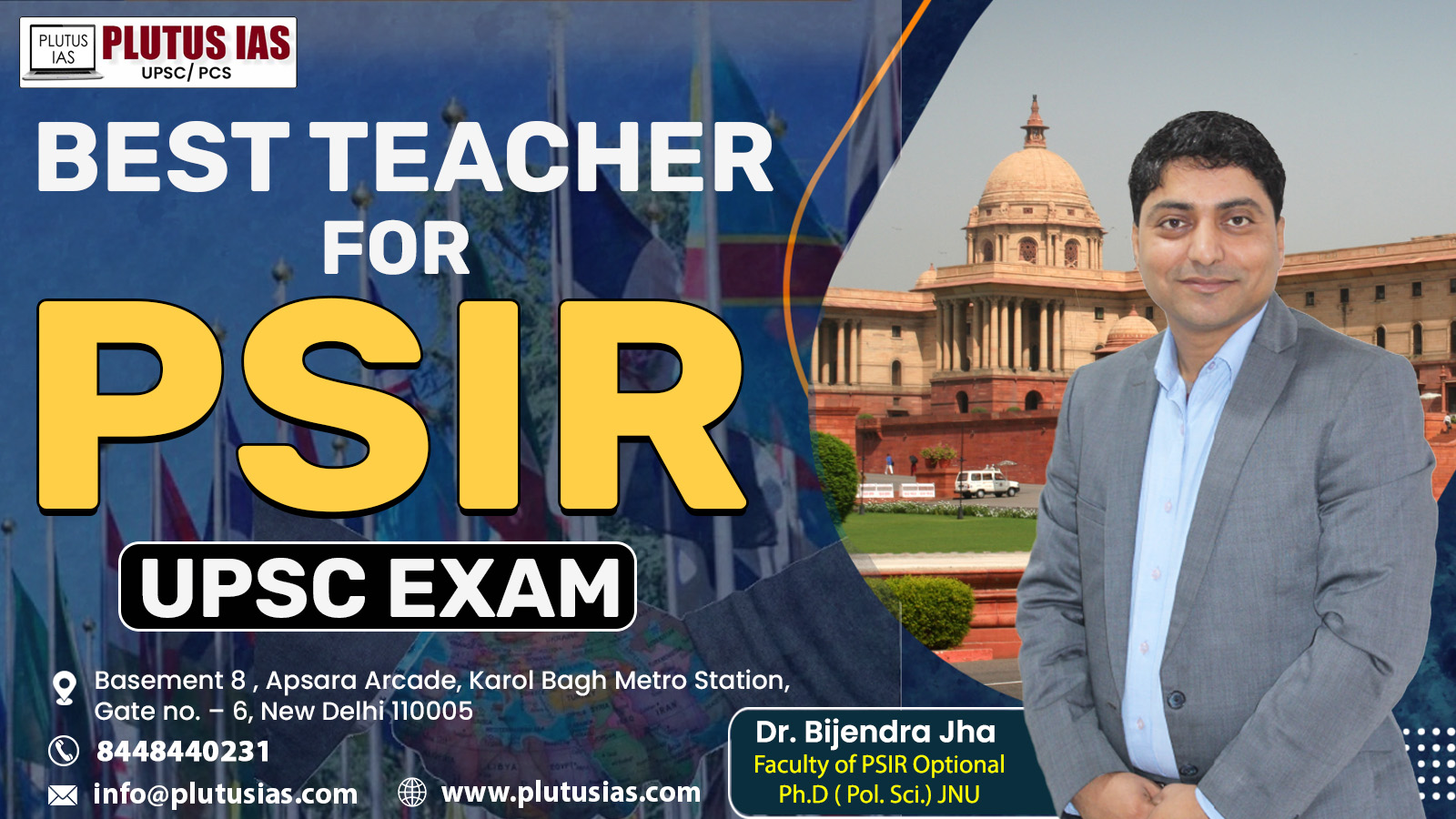Political Science & International Relation

PSIR OPTIONAL | PSIR OPTIONAL UPSC COACHING
UPSC CSE is one of the prominent competitive exams held in India for various positions in the Indian Government. The Exam is conducted in three phases: Preliminary, Main, and Interview. Moreover, in the Main exam aspirants are given a chance to pick 1 Optional Subject of their choice. Political Science and International Research (PSIR) is one of the 48 Optional Subjects offered by UPSC in the Main Exam.
PSIR includes two parts Political Science which deals with political ideas, laws, and more. And International Research which covers topics like international news and the interaction of different countries with each other. Moreover, the subject has two papers Paper 1 and Paper 2, both carrying 250 Marks each, totaling 500 Marks.
BEST TEACHER FOR PSIR OPTIONAL | Best PSIR Optional Coaching
Dr. Bijendra Jha has achieved an M.Phil. and Ph.D. in Political Science from J.N.U. Moreover, Sir has authored multiple papers and reports centered on socio-economic affairs, governance, and political research. He brings over a decade of teaching experience and serves as an associate with Patrick Heller at Brown University. Additionally, through his guidance, many aspirants have excelled in PSIR Optional Papers. Furthermore, he is very interactive with the students and personally guides every student. He resolves doubts and queries ensuring that students get a clear understanding of each and every topic thoroughly.
PLUTUS IAS | Best Coaching for PSIR Optional
Plutus IAS is the first choice of aspirants regarding PSIR Optional Coaching. Moreover, this pristine coaching institute provides the best teacher for PSIR Optional, Dr. Bijendra Jha. Sir has a profound knowledge of PSIR and is keen on sharing his knowledge with his students. Moreover, he ensures that every student receives the best education for PSIR Optional subject. Plutus IAS believes in a small batch size of about 40-50 students, this is to make certain that every student gets personal attention and guidance from the teacher. Furthermore, this also ensured better two-way communication between the faculty and the students. Doubt-solving sessions are held after every class to ensure that all the students’ queries get resolved. Additionally, test series are held at the coaching institute to check students’ progress. Personalized feedback is given to the students based on their performance, this helps students figure out their weak points and work on them.
ONLINE & HYBRID FACILITY FOR PSIR OPTIONAL AT PLUTUS IAS
With the changing world and modernization, people are becoming drawn towards technology. Moreover, many aspirants are going for online coaching rather than traditional. To keep up with this modernization, Plutus IAS has an Online Mode of coaching for aspirants wanting to do distance learning. Furthermore, the online facility at Plutus IAS gives access to the students till the batch ends. It also provides students with Live Lectures, Recorded Lectures, and PDF Notes. These facilities have proven to be very beneficial for students in their PSIR Optional preparation. Additionally, Plutus IAS also provides a Hybrid Mode of learning, which allows students to take the benefit of both Offline and Online Classes at the same time. This is the best facility for students who are looking for flexibility and time efficiency.
Fee Structure
The fee structure for PSIR Optional at Plutus IAS is as follows:
Offline Fee: Rs. 60,000 (incl. GST)
Online Fee: Rs. 55,000 (incl. GST)
Hybrid Fee: Rs. 65,000 (incl. GST)
PLUTUS IAS | Best PSIR Optional Coaching
| Factors | Qualities |
| Faculty | Dr. Bijendra Jha |
| Batch Strength | 40-50 |
| Pedagogy | Interactive, Test Series, Notes Giving |
| Infrastructure of online facility | Provides unlimited access till the batch ends. |
| Performance of students | Students are well satisfied with the optional subject and cracked the UPSC exam |
| Feedback from former students | The teachers at Plutus IAS are simply the best. With great experience, they teach with the uttermost patience and are always there to clarify doubts. Their class notes are concise and relevant. It is one of the best IAS coaching institutes in Delhi. |
| Offline Fees | Rs. 60,000 (incl. GST) |
| Online Fees | Rs. 55,000 (incl. GST) |
| Hybrid Fees | Rs. 65,000 (incl. GST) |
| Website | Plutus IAS |
| Address | Apsara Arcade, Basement 8 Gate no. – 6, Metro Station, Karol Bagh, New Delhi, Delhi 110005 |
| Phone Number | 8448440231 |
| Mode | Online, Offline & Hybrid |
| Google Direction Link | Google Map Link |
UPSC HISTORY OPTIONAL PREVIOUS YEARS QUESTION PAPER:
FAQS of PSIR optional
Q. Why should you choose PSIR as an optional?
Q. What should be your plan of preparation regarding PSIR?
Q. How will our PSIR optional course by Dr. Bijendra Jha help you?
Q. What materials should you refer to?
Q. What are the features of our optional course?
| # | ONLINE FEE | OFFLINE FEE | HYBRID FEE | BATCH STARTS FROM |
|---|---|---|---|---|
| 1 | 55,000/- | 60,000/- | 65,000/- | REGISTRATION – START |



